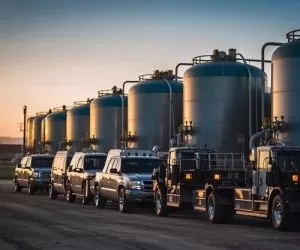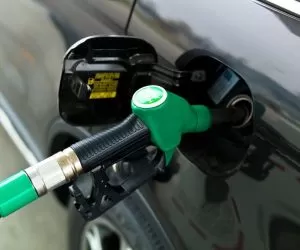
Eco-Warriors Unite: How Gas Stations Can Engage with Environmental Activists to Promote FlexFuels

From transportation to energy production, the world is looking for cleaner and more sustainable solutions to reduce greenhouse gas emissions and combat climate change. One of these solutions is the use of FlexFuels, which have the potential to reduce the carbon footprint of our transportation systems significantly. Gas stations play a critical role in promoting these fuels, and by engaging with environmental activists, they can help drive the adoption of FlexFuels and contribute to a greener future.
Introduction
FlexFuels, also known as ethanol-blended gasoline, are a cleaner alternative to traditional gasoline that can help reduce our reliance on fossil fuels and decrease greenhouse gas emissions. Produced by combining ethanol (a renewable fuel source) with gasoline, FlexFuels burn more efficiently and produce fewer pollutants than conventional gasoline. Gas stations can play a pivotal role in promoting FlexFuels by engaging with environmental activists, who can help spread awareness about the benefits of these eco-friendly fuels and encourage consumers to make more sustainable choices.
In this blog post, we will explore the importance of partnering with environmental activists, discuss strategies for collaboration, and provide examples of successful partnerships between gas stations and environmental groups. By the end, you will better understand how your gas station can work with eco-warriors to promote FlexFuels and contribute to a more sustainable future.
Background: Environmental Activists and FlexFuels
Environmental activists have long been advocating for sustainable energy solutions to reduce our reliance on fossil fuels and mitigate the effects of climate change. Transportation accounts for 28% of U.S. greenhouse gas emissions, making it the largest contributor to our carbon footprint. To tackle this issue, activists have been pushing for the use of cleaner and more efficient fuels like FlexFuels.
FlexFuels, typically composed of E85 (85% ethanol and 15% gasoline), can help reduce greenhouse gas emissions by approximately 34% compared to gasoline when considering the entire fuel life cycle. By promoting renewable energy sources like ethanol, which is derived from plant materials such as corn and sugarcane, FlexFuels contribute to a more sustainable and eco-friendly transportation industry.
The Importance of Gas Stations in Promoting FlexFuels
As the primary point of sale for vehicle fuels, gas stations play a crucial role in informing consumers about their fuel choices and, ultimately, determining which products succeed in the market. By providing customers with information about the environmental benefits of FlexFuels and offering incentives to choose these cleaner alternatives, gas stations can help drive the adoption of these eco-friendly fuels.
Protec Fuel, a leading wholesale distributor of ethanol-blended gasoline, is dedicated to providing turnkey ethanol solutions to distributors, retailers, and fleets across the nation. With over two decades of experience in the ethanol fuel industry and a commitment to reducing emissions, Protec Fuel offers a range of services, including turnkey ethanol solutions, fuel risk management, supply and logistics, and profit strategies. To learn more about Protec Fuel’s bulk fuel solutions for your business, visit protecfuel.com or contact them at [email protected] or (561) 392-3667.
Strategies for Engaging with Environmental Activists
To successfully promote FlexFuels and collaborate with environmental activists, gas stations should consider implementing the following strategies:
1. Educate and Inform
Providing accurate and comprehensive information about FlexFuels is essential for building trust and credibility with environmental activists and customers alike. Gas stations should:
- Explain the benefits of FlexFuels for the environment, including reduced greenhouse gas emissions and a decreased reliance on fossil fuels
- Address common misconceptions about biofuels, such as concerns about food security and land use changes
- Share relevant studies and statistics that support the environmental benefits of FlexFuels, like the research showing their potential for reducing greenhouse gas emissions
2. Collaborate with Local Environmental Organizations
Partnering with environmental groups can help gas stations amplify their message and reach a larger audience. Consider:
- Collaborating on events and campaigns that promote the use of FlexFuels and other sustainable practices
- Supporting local initiatives to reduce emissions, such as tree planting or community cleanups
- Sharing success stories and best practices from other gas stations that have successfully engaged with environmental activists

3. Create Incentives for Customers to Choose FlexFuels
Offering special promotions or discounts for FlexFuel purchases can encourage customers to make more eco-friendly choices. Gas stations can:
- Implement loyalty programs that reward customers for choosing FlexFuels, such as bonus points or exclusive offers
- Provide free resources, like brochures or posters, which inform customers about the benefits of FlexFuels and encourage them to consider these cleaner alternatives
4. Promote Sustainability at Gas Stations
Implementing eco-friendly practices at gas stations can demonstrate a commitment to sustainability and help win the support of environmental activists. Consider:
- Adopting energy-efficient lighting, recycling programs, and other green initiatives at your station
- Highlighting the use of renewable energy sources, such as solar panels or wind turbines, in station operations
- Encouraging customers to adopt sustainable practices, like reducing idling time or properly inflating their tires to improve fuel efficiency
5. Host Community Events and Initiatives
Organizing educational workshops or seminars about FlexFuels and sustainability can help build rapport with environmental activists and the local community. Gas stations can:
- Participate in local Earth Day events or other environmental celebrations to highlight their commitment to sustainability
- Sponsor community initiatives that promote eco-friendly transportation, such the installation of bike racks or electric vehicle charging stations
Case Studies: Successful Partnerships between Gas Stations and Environmental Activists
Several gas stations have successfully engaged with environmental activists to promote FlexFuels and other sustainable practices. Here are a few examples:
- Pearson Fuels, a California-based gas station chain, has partnered with local environmental organizations to host events and promote the use of E85 fuels. They have even created an app to help customers locate their nearest E85 station.
- Kum & Go, a Midwest-based convenience store and gas station chain, implemented eco-friendly practices, such as energy-efficient lighting and recycling programs, while also offering E85 fuel options at select locations.
These case studies demonstrate that collaboration between gas stations and environmental activists can lead to increased awareness and adoption of FlexFuels, benefiting both the environment and the bottom line.
Overcoming Challenges in Engaging with Environmental Activists
While partnering with environmental activists can bring many benefits, gas stations may also encounter challenges, such as:
- Addressing concerns about the sustainability of biofuel production, including land use changes and potential impacts on food prices
- Navigating potential conflicts of interest between gas stations and environmental groups, especially when it comes to advocating for the reduction of fossil fuel consumption
- Finding common ground to promote a shared goal of reducing emissions and encouraging sustainable transportation options
By being transparent, highlighting the environmental benefits of FlexFuels, and demonstrating a commitment to sustainability, gas stations can overcome these challenges and foster productive partnerships with environmental activists.
Conclusion
Collaboration between gas stations and environmental activists is essential for promoting the widespread adoption of FlexFuels and reducing transportation-related greenhouse gas emissions. By engaging with eco-warriors, implementing sustainable practices, and offering incentives to choose cleaner fuel options, gas stations can play an essential role in creating a greener future.
Are you interested in learning more about Protec Fuel’s bulk fuel solutions for your business? Visit protecfuel.com or contact them at [email protected] or (561) 392-3667. We can promote FlexFuels and contribute to a more sustainable and eco-friendlier world.

FAQ: Engaging with Environmental Activists to Promote FlexFuels
Q: What are FlexFuels?
A: FlexFuels, also known as ethanol-blended gasoline, are a cleaner alternative to traditional gasoline. They are produced by combining ethanol, which is derived from plant materials, with gasoline. FlexFuels burn more efficiently and produce fewer pollutants than conventional gasoline, helping to reduce greenhouse gas emissions and our reliance on fossil fuels.
Q: How can gas stations promote FlexFuels?
A: Gas stations can promote FlexFuels by engaging with environmental activists, offering incentives for customers to choose FlexFuels, implementing eco-friendly practices at their stations, and hosting community events and initiatives. This collaboration helps raise awareness about the benefits of FlexFuels and encourages consumers to make more sustainable choices.
Q: Why should gas stations collaborate with environmental activists?
A: Collaborating with environmental activists can help gas stations amplify their message, reach a larger audience, and gain credibility in the eyes of environmentally conscious consumers. Partnering with environmental groups on events, campaigns, and local initiatives can also help demonstrate a gas station’s commitment to sustainability.
Q: What challenges might gas stations face when engaging with environmental activists?
A: Some challenges that gas stations might face when engaging with environmental activists include addressing concerns about the sustainability of biofuel production, navigating potential conflicts of interest, and finding common ground to promote a shared goal of reducing emissions. Transparency, highlighting the environmental benefits of FlexFuels, and demonstrating a commitment to sustainability can help overcome these challenges.
Q: What are some examples of successful partnerships between gas stations and environmental activists?
A: Pearson Fuels in California and Kum & Go in the Midwest have both successfully partnered with environmental organizations to promote the use of FlexFuels and implement sustainable practices at their stations. These collaborations have led to increased awareness and adoption of FlexFuels, benefiting both the environment and the bottom line.
Q: How can I learn more about Protec Fuel’s bulk fuel solutions for my business?
A: To learn more about Protec Fuel’s bulk fuel solutions, visit protecfuel.com, or contact them at [email protected] or (561) 392-3667. Protec Fuel offers a range of services, including turnkey ethanol solutions, fuel risk management, supply and logistics, and profit strategies to help promote FlexFuels and contribute to a more sustainable future.





